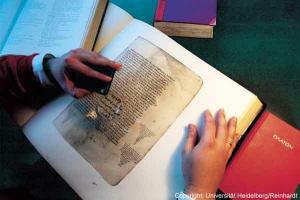Greek (Classical Philology)
| Degree: | Bachelor of Arts |
| Application: | not required |
| Course commences: | winter semester / summer semester |
| Standard course duration: | 6 semesters |
| Focus options: | 50% (with Teaching Degree option); 25% |
| Language requirements: |
certified proficiency in Greek (Graecum) |
| Language of instruction: | German / English |
Note for prospective students interested in coming to Heidelberg University to take the Teaching Degree course qualifying its graduates to teach at higher secondary (grammar) schools (Gymnasien) in Germany:
In accordance with the statutory provisions laid down by the State of Baden-Württemberg, students wishing to embark as of winter semester 2015/2016 on a Teaching Degree qualifying them to teach at higher secondary (grammar) schools (Gymnasien) in Germany can only do so by enrolling in two-tier courses with a Bachelor/Master structure (polyvalent two-subject (50%) Bachelor programme with a Teaching Degree option; Master of Education course scheduled to start in winter semester 2018/2019).
As of winter semester 2015/2016, the subject described on this page can be studied in a polyvalent two-subject (50%) Bachelor course with a Teaching Degree option. It has to be combined with another 50% subject of relevance for secondary-school education.
For more information, go to https://www.uni-heidelberg.de/studium/zlb/
Note for students already enrolled in a Teaching Degree course in the framework of the Examination Regulations for Teachers at Higher Secondary Schools (GymPO I):
In the winter semester 2015/2016 and later, students enrolled by 31 July 2015 in a Teaching Degree course regulated by the provisions of GymPO I (2009) are entitled to switch to a different main subject under the conditions set out in said GymPO provided that the change is in accordance with the statutory provisions.
In this case, the following transitional regulations apply: http://www.uni-heidelberg.de/md/studium/zlb/beratung/150515_gympo-uebergangsregelungen_final.pdf
For more information, go to https://www.uni-heidelberg.de/studium/zlb/
Course outline
Classical Philology encompasses the two independent but closely linked subjects Greek and Latin, both of which are taught at the Department of Classical Philology.
As a subject, “Greek” (or more precisely Greek Philology; “Greek” here refers to ancient Greek) is defined by its prime concern, engagement with the Greek texts that have come down to us from antiquity.
Research, coursework and teaching focus on the following topics:
- the Greek language as the communication system underlying the texts
- the texts as literature and their formative principles
- Greek culture as context
Greek Philology and Latin Philology add up to “Classical Philology”. For a long time, Latin literature existed in a close symbiosis with Greek culture, accordingly it is an important source for the reconstruction and understanding of Greek traditions. In addition, Latin was originally the language in which scholarly work in Classical Philology was couched. Even today, knowledge of Latin is necessary to understand secondary literature written in that language.
The purview of “Greek Philology” comes to an end on the threshold of the Middle Ages, i.e. approx. in the 6th century AD. The follow-on subjects are Byzantine Studies and Modern Greek Philology. While these subjects cannot be studied in their own right at Heidelberg University, there are Modern Greek language and literature courses on offer at our Department. A special subject within Greek Philology is Papyrology, which at Heidelberg has an institute of its own with an original papyrus collection and a full-scale curriculum.
In methodological terms, two approaches are important and need to be seen in conjunction with one another. One is historical, the other structural.
The historical approach sets out to grasp a text, its origins and its impact in terms of the conditions operative in the age in which it was written. This approach links Greek Philology with other subjects that come under the heading of Ancient Studies, notably Ancient History, Classical Archaeology and Indo-Germanic Studies. They all share the goal of casting light on the culture of the Graeco-Roman civilisations in antiquity.
The structural approach involves concentrating on the text in itself, its form, its message and its stylistic/aesthetic qualities. Here the link is with other “philological” subjects (i.e. subjects focusing on language and literature) that take the same or a similar approach to the works they investigate.
The identity of Greek Philology as a subject and its status as a meaningful choice for study hinge very largely on the way it relates to the present. Two perspectives suggest themselves.
- Continuity: Greek civilisation and the language and literature it produced are seminal for the evolution of European culture. Its particularities (for instance, its specific rationalism) took shape against the backdrop of high Near Eastern and Egyptian cultures. Since the Renaissance above all, the traditions of Greek culture have been repeatedly drawn upon and have developed into a driving force behind modern-day developments. Continuity issues of this kind are frequently associated with the terms “impact” or “reception” and represent a key research focus in Heidelberg.
- Contrast: Despite the obvious historical links, Greek culture and the Greek language are very remote from the world of present-day Europe. A highly inflectional language, a pre-Christian, non-rationalised religion, a mode of thought that only very gradually turned away from a mythological world view and remained profoundly affected by it, a pre-industrial society: these are the foundations for contrastive studies that can contribute much to defining the identity of the present-day world.
Greek linguistics
Scholarly engagement with the Greek language, accorded a place of its own in lectures and seminars, focuses first of all on its prehistory, which can be elucidated with the help of comparative methods. Major attention is paid to phonological aspects and the evolution of the phonetic laws, moving on from there to examine the different stages of Ancient Greek: the Mycenaean form of the language, the dialects of the historical era, the emergence of literary language and its variants. One research focus is post-classical colloquial language, so-called koine, from which modern Greek finally developed.
Alongside this predominantly historical approach, various synchronicities of the language are dealt with, e.g. regional and social differentiation, text linguistics and so forth.
Heidelberg differs from some other universities in Germany in that in line with international norms Greek linguistics is taught at the Department of Classical Philology.
Greek literary studies
The literary side of the course concentrates on enabling students to get to know important works by reading them in the original language. Students are called upon to compile an individual reading programme encompassing representative works of the most important authors, epochs and genres. Most of this reading will need to be done during the semester breaks. Independent reading cannot be replaced by classes. The “reading classes” in the curriculum can be no more than a stimulus.
The course centres on the great classical works of Greek literature: Homer, the tragedians, the historians Herodotus and Thucydides, Plato. Other genres and periods are also discussed and more advanced students are given an opportunity to pursue their personal interests.
The central task of literary studies is the understanding of the individual work, its interpretation. This understanding builds on a number of part-disciplines discussed mainly in seminars: stylistics and metrics, rhetoric, textual criticism (i.e. reconstruction of the original text from partly contradictory manuscript versions), mythology and religious history, everyday life, legislation and the state, and the history of the impact of these great classics on modern literature, art and music. Heidelberg has a unique collection of sheet music and recordings reflecting the immense range of settings of ancient texts from the Baroque to the present.
Greek culture
This aspect cannot be fully and systematically represented at B.A. level. Insights are however vouchsafed (a) by classes in other subjects like Archaeology and Ancient History, (b) by excursions to ancient culture sites (excavations, museums), (c) by classes on individual culture-historical topics, e.g. Greek religion.
Prerequisites for the course
Students embarking on the course will need to be in possession of the Graecum or an equivalent certificate of proficiency in Greek. Those opting for Greek as a joint-main subject in their Teaching Degree or the B.A. programme will also require the Latinum (or equivalent). Students unable to produce evidence of proficiency at this level (school-leaving certificate, additional exam, etc.) will have to remedy this deficiency. Courses for this purpose are offered by the University. Students also need to have a good reading knowledge of two modern foreign languages.
Main research interests
Literary studies
- hermeneutics and rhetoric
- ancient theories of literature
- ancient philosophy
Linguistics
In the study of Ancient Greek and Latin, linguistics figures as a sub-discipline of Classical Philology that is closely connected with the study of literature (this proximity to literary studies is grounded largely in the use of structuralist procedures in textual analysis and narratology). With its strongly systematic and historical bias, the linguistic component is dedicated to the formal description of textual constituents of all kinds, its main emphasis naturally being language itself. Another of its tasks is to elucidate the language theories of the ancient Greeks and Romans, which are still of seminal significance for present-day language studies both in Europe and elsewhere. These theories are implicit in the wealth of disquisitions on grammar, rhetoric, poetics and language philosophy that have come down to us. A further concern is the analysis of prosody and metre in Greek and Roman poetry. Scholarly editing and textual criticism are also a major focus.
Formal requirements
Admission
Bachelor/Teaching Degree: There are no admission restrictions. Click here for instructions on how to enrol.
International applicants
There are special regulations for international applicants. For more information, apply to the International Relations Office of Heidelberg University (Seminarstraße 2).
Subject combinations
Possible subject combinations are listed in the Catalogue of Subjects.
Study and examination regulations
Examination regulations B.A. (26 March 2015)
Regulations on Intermediary Examinations: Teaching Degree (29 April 2010)
Study and Examination Regulations for Teaching Degree Courses – General part (29 April 2010)
Regulations on Intermediary Examinations: Teaching Degree (15 June 2000)
Academic Examination Regulations (WPO 2001)
Examination regulations B.A. (28 March 2007)
Module Handbook
Please click here to find the latest Module Handbook.
Examinations board
Issues arising in connection with examinations, credit transfer and academic credential recognition are dealt with by the relevant examinations board/office. For more information, consult the academic advisor(s) indicated below.
Fees
Tuition fees at Heidelberg University are payable at the beginning of each semester.
M.A. course
Heidelberg University offers consecutive M.A. courses in Classical Philology (Greek) and Classical and Modern Literary Studies.
Academic advisors
http://www.uni-heidelberg.de/fakultaeten/philosophie/skph/studienberatung.html
Contact
Department of Classical Philology
Marstallhof 2-4
D-69117 Heidelberg
Secretaries' office:
phone: +49 (0)6221 542265
fax: +49 (0)6221 543381
e-mail: sekretariat@skph.uni-heidelberg.de
Internet: www.klassische-philologie.uni-hd.de
Location


